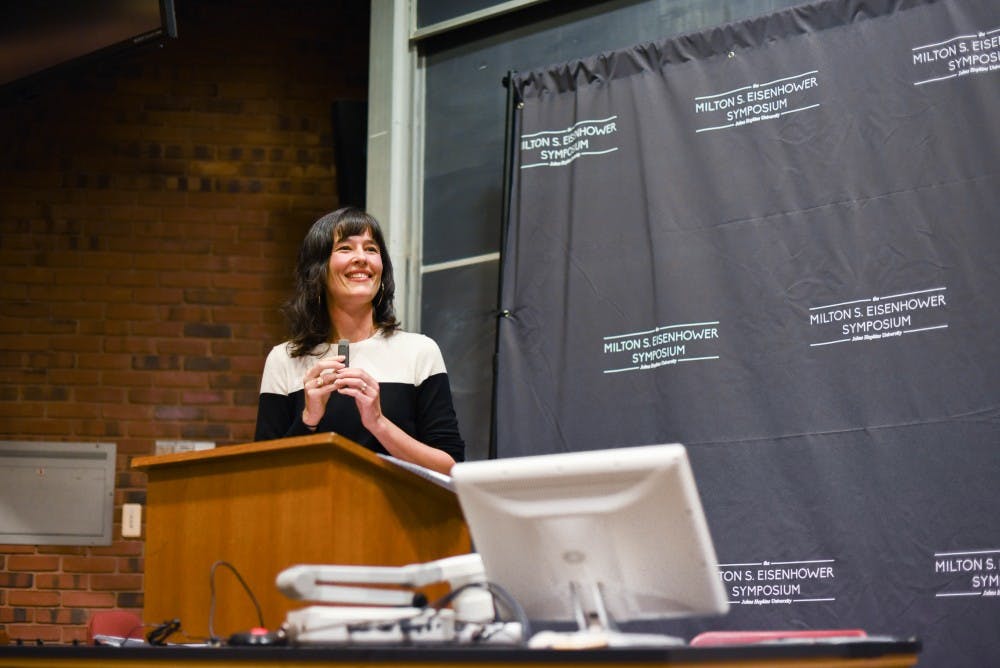Megan Twohey, one of the two investigative reporters at the New York Times who broke the story of the Harvey Weinstein sexual assault allegations, kicked off the Milton S. Eisenhower (MSE) Symposium lineup on Wednesday night at Mudd Hall.
Before exposing Weinstein’s sexual misconduct, which many credit as the trigger for the #MeToo movement, Twohey reported for the Chicago Tribune where she exposed Chicago police officers for shelving DNA rape kits. She also examined numerous cases in which Illinois doctors sexually assaulted their patients and also reported for Reuters on Americans who were using the internet to abandon children they had adopted abroad.
“When I became a journalist, the issue of sexual assault followed me as I moved from one newsroom to the next, or perhaps I followed it,” she said. “Over the years, through my reporting and writing, I have exposed a variety of sexual predators and the institutions and the individuals and cultural attitudes that have protected them.”
Twohey discussed the experiences that cemented her career path as a reporter investigating sexual harassment and assault, beginning with her experiences at Georgetown University. While the school did not offer a journalism program and only had one introductory journalism class, Twohey said that her experiences outside the classroom shaped her career as a journalist.
In her sophomore year, Twohey helped organize a Take Back the Night rally on campus in an effort to protest sexual violence. The rally drew hundreds of protesters who marched through the streets around Georgetown.
“By that point in my life, I knew people who were close to me who were victims of sexual assault and rape,” she said. “The culture of drunken hookups prevalent on all college campuses came with a new set of questions about what constituted consent.”
After the rally, survivors spoke about their experiences with sexual violence on campus. Twohey noted that many were afraid to open up about their experiences.
“I saw that deafening silence as dangerous – a way to protect rapists and keep victims hidden,” she said. “The whole event helped break the silence and bring the problem into the light. I’ll never forget it.”
In working alongside Jodi Kantour to break the Weinstein story, Twohey helped galvanize the #MeToo movement. As a journalist, however, Twohey said that her role is different from that of an activist.
“Now more than ever, I think it’s important to make this distinction,” she said. “Instead of taking to the streets to protest like I did when I was 20, instead of lobbying the government for new laws, we reporters gather the facts, pick up the pen and hope that by revealing the truth in our stories, we can bring about change... I found time and again that exposing the truth does in fact make a difference.”
Before breaking the Weinstein story, Twohey said that she and Kantour did not know what impact their reporting would have. Some expressed doubts that their reporting would have any impact.
“The #MeToo movement has surged past every forecast that it would burn out, settle down or be erased by a backlash,” Twohey said.
Despite the movement, however, Twohey said that there has been little change in the institutions complicit in sexual violence. Most recently, she said this manifested in Brett Kavanaugh’s confirmation vote.
“It’s imperative for us to keep asking the tough questions,” she said. “All of us must strive to understand how all these instances of sexual violence and rape and misconduct happened to our friends, to our colleagues, to our loved ones, and what are the systemic changes that must happen to ensure that they won’t happen again.”
Junior Maya Foster enjoyed hearing about the reporting process behind the Weinstein story, saying that she came to the event to hear how Twohey and Kantour “brought it to life.”
“When you see a newspaper article, all you see is the storyline,” Foster said. “But seeing the stuff that happens before the storyline, all the effort that goes in... I appreciate these stories a little more, and it gives them more meaning.”
Junior Meghna Kumar felt that the talk was an important way to encourage more conversations on sexual assault at Hopkins.
“College is the perfect environment to have discussions about these things,” Kumar said. “These are things that women interact with everyday. Either we’ve faced [sexual misconduct] already or will at some point or know people who have.”
MSE Symposium Marketing Chair Indira Rayala agreed that people do not pay enough attention to sexual harassment and assault at Hopkins.
“Sexual harassment and assault have always been pushed under the rug,” she said. “We thought we could get students thinking about this, about the #MeToo movement and how it affects our college campus.”





